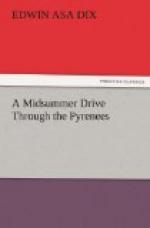It is a significant comment on the period, that amid the commotion at the inn the first thought was of foul play. “The two squires who had brought water to wash in the basin said, to free themselves from any charge of having poisoned him: ’Here is the water; we have already drank of it, and will now again in your presence,’ which they did, to the satisfaction of all. They put into his mouth bread and water and spices, with other comforting things, but to no purpose, for in less than half an hour he was dead, having surrendered his soul very quietly. God, out of his grace, was merciful to him.”
He was entombed before the altar in the little church at Orthez, with imposing obsequies. No epitaph remains, but this of a preceding Gaston, buried in the same church, deserves note for its curious, jingling Latin rhyme:
“Continet haec fossa Gastonis principis
ossa,
Nobilis ac humilis aliis, pulvis sibi
vilis,
Subjectis parcens, hastes pro viribus
arcens.
Da veniam, Christe, flos militiae fuit
isle,
Et virtute precum, confer sibi gaudia
tecum,
Gastonis nomen gratum fert auribus omen,
Mulcet prolatum, dulcescis saepe relatum,”
Two hundred years afterward, in the tumult of Protestant iconoclasm, Gaston Phoebus’s tomb was broken open, its debris sold, piece by piece, and Montgomery’s Huguenots derisively kicked the august skull about the streets of Orthez and used it for a bowling-ball:
“They hopped among the weeds and
stones,
And played at skittles with his bones.”
VIII.
There are a few gleams of humor among these grim recounts. It was always tinged with the sardonic. Pitard, moralist and pedant, staying at the Bearnais court, fell into a dispute with a poet, Theophile:
“‘’T is a pity,’ sneered Pitard, finally, ’that, having so much spirit, you know so little!’
“‘’T is a pity,’ retorted Theophile, ’that, knowing so much, you have so little spirit!’”
Often the jests take a religious turn. The chaplain of one of the counts of Orthez, defending his own unpriestly fondness for hunting, asserted that the ten horns of the stag (cerf) stood for the Decalogue; and that the stag was to be as ardently followed as the sovereign pontiff, the latter being himself le cerf des cerfs,—servus servorum.
If a husband were seriously rasped by his wife, or their tempers could not agree, he was wont to retire her to a convent. “He did not send her to the devil,” remarks a sly annalist, “but he gave her to the Lord.”
And read this whimsical epitaph on an organist of the cathedral at Lescar, a bishopric near Orthez. He died in the fifteenth century:
“As you pass,
pray God for his soul, that having assisted in the
music of this world,
he may be received forever among the blessed
to assist in the celestial
music. Amen.”




